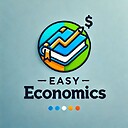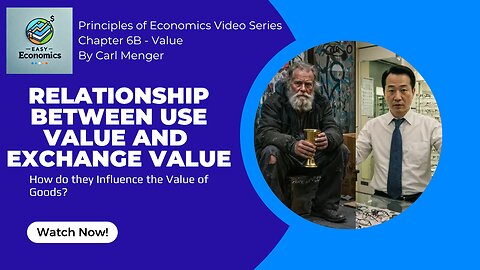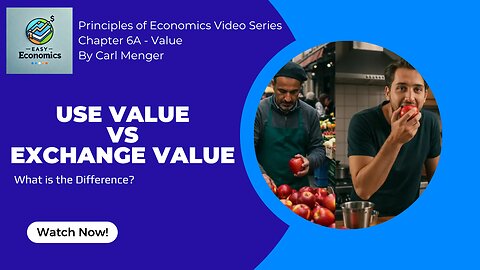
Austrian Economics Perspective in Real Life
4 videos
Updated 4 months ago
Austrian Economics in Real Life – Real Answers for Real Problems
This playlist takes today’s biggest economic, political, and social challenges and looks at them through the lens of Austrian Economics. Whether it's inflation, housing crises, central bank policies, or financial bubbles, we cut through the noise with clear, principle-based explanations rooted in the work of thinkers like Ludwig von Mises, Friedrich Hayek, and Carl Menger.
Each video connects timeless Austrian insights—like subjective value, entrepreneurship, and sound money—to real-world events you see in the headlines. No academic jargon, no political bias—just solid economics that helps you understand what’s really going on and what it means for your money, your freedom, and your future.
If you're tired of shallow takes and want to see how Austrian Economics offers deeper understanding and practical answers, this series is for you.
-
Principles of Economics by Carl Menger Chapter 6C - Changes Between Use and Exchange Value
 EasyEconomicsYou want to read the book? Get it here: 👉 https://amzn.to/4exiAKW Watch the next video in this series: https://rumble.com/v6v08y9-principles-of-economics-by-carl-menger-chapter-7.1-what-is-a-commodity.html Watch the video series from the start: https://rumble.com/playlists/I48mBTB4w2c Watch our video about Carl Menger: https://rumble.com/v61z0l2-carl-menger-the-father-of-austrian-economics-and-subjective-value.html How does the value of a good shift over time—and what drives those changes? In this video, we explore Carl Menger’s Principles of Economics, Section 6C: The Shift in the Economic Center of Gravity of the Value of Goods. A central task in economics is deciding whether a good is more valuable to use or to trade. Menger shows that this decision isn’t fixed—it changes with personal needs, market conditions, and the condition or quantity of the good itself. Imagine someone loses interest in wine or hunting. What once had high use value now only holds exchange value—so they sell it. As people grow older, change careers, or experience shifts in lifestyle, they often reassess what’s worth keeping versus what’s worth trading. The condition of a good also matters. A damaged coat may no longer be sellable, but it might still be perfectly useful. On the flip side, something barely damaged might lose its use value to a wealthy owner but still retain trade value on the market. But the biggest influence? Quantity. A surplus lowers use value and increases the incentive to trade. Scarcity raises use value and makes people hold onto what they have. Wealth changes value perceptions, too: the newly poor sell off luxuries; the newly rich replace modest goods with higher-end ones. Menger’s insight: value is always about meeting needs, and the dominant form of value—use or exchange—depends on how a good best serves that purpose. ❓ Questions This Video Answers: -Why does the value of a good shift over time? -What determines whether use value or exchange value matters more? -How does personal change affect economic decisions? -What role does the condition of a good play in its value? -Why does surplus lead to more trading? -Why do the wealthy and the poor treat goods differently? -What happens when supply shrinks or wealth grows? -How does family life affect economic decisions? -Can a worthless good in trade still be useful? -What’s the main factor in choosing to use or sell something? 00:00 - Introduction to Economic Center of Gravity of the Value of Goods 00:12 - Use Value or Exchange Value 00:51 - Changes in Personal Needs and Preferences 02:05 - Changes in the Condition of Goods 02:39 - Changes in Quantity and Wealth 03:50 - Outro #ValueShift #UseOrExchange #CarlMenger6 views
EasyEconomicsYou want to read the book? Get it here: 👉 https://amzn.to/4exiAKW Watch the next video in this series: https://rumble.com/v6v08y9-principles-of-economics-by-carl-menger-chapter-7.1-what-is-a-commodity.html Watch the video series from the start: https://rumble.com/playlists/I48mBTB4w2c Watch our video about Carl Menger: https://rumble.com/v61z0l2-carl-menger-the-father-of-austrian-economics-and-subjective-value.html How does the value of a good shift over time—and what drives those changes? In this video, we explore Carl Menger’s Principles of Economics, Section 6C: The Shift in the Economic Center of Gravity of the Value of Goods. A central task in economics is deciding whether a good is more valuable to use or to trade. Menger shows that this decision isn’t fixed—it changes with personal needs, market conditions, and the condition or quantity of the good itself. Imagine someone loses interest in wine or hunting. What once had high use value now only holds exchange value—so they sell it. As people grow older, change careers, or experience shifts in lifestyle, they often reassess what’s worth keeping versus what’s worth trading. The condition of a good also matters. A damaged coat may no longer be sellable, but it might still be perfectly useful. On the flip side, something barely damaged might lose its use value to a wealthy owner but still retain trade value on the market. But the biggest influence? Quantity. A surplus lowers use value and increases the incentive to trade. Scarcity raises use value and makes people hold onto what they have. Wealth changes value perceptions, too: the newly poor sell off luxuries; the newly rich replace modest goods with higher-end ones. Menger’s insight: value is always about meeting needs, and the dominant form of value—use or exchange—depends on how a good best serves that purpose. ❓ Questions This Video Answers: -Why does the value of a good shift over time? -What determines whether use value or exchange value matters more? -How does personal change affect economic decisions? -What role does the condition of a good play in its value? -Why does surplus lead to more trading? -Why do the wealthy and the poor treat goods differently? -What happens when supply shrinks or wealth grows? -How does family life affect economic decisions? -Can a worthless good in trade still be useful? -What’s the main factor in choosing to use or sell something? 00:00 - Introduction to Economic Center of Gravity of the Value of Goods 00:12 - Use Value or Exchange Value 00:51 - Changes in Personal Needs and Preferences 02:05 - Changes in the Condition of Goods 02:39 - Changes in Quantity and Wealth 03:50 - Outro #ValueShift #UseOrExchange #CarlMenger6 views -
Principles of Economics by Carl Menger Chapter 6B - Relationship Use Value and Exchange Value
 EasyEconomicsYou want to read the book? Get it here: 👉 https://amzn.to/4exiAKW Watch the next video in this series: https://rumble.com/v6uyctz-principles-of-economics-by-carl-menger-chapter-6c-changes-between-use-and-e.html Watch the video series from the start: https://rumble.com/playlists/I48mBTB4w2c Watch our video about Carl Menger: https://rumble.com/v61z0l2-carl-menger-the-father-of-austrian-economics-and-subjective-value.html Which matters more—use value or exchange value? In this video, we explore Carl Menger’s Principles of Economics, Section 6B: The Relationship Between Use Value and Exchange Value of Goods. In self-sufficient economies, goods either have use value or no value at all. But as trade develops, a new layer of value appears—exchange value, or the ability of a good to be traded for something else we need. Some goods—like a crutch or private notes—are valuable to the owner but can’t be traded. Others—like optician tools or foreign-language books—have no use to the owner but can be traded easily. But in most real-world situations, goods have both types of value. Think of jewelry, furniture, or a smartphone—you can use them, or you can trade them. The important question is: which value is greater in your situation? Menger explains that when a good has both use and exchange value, the higher of the two determines how you treat it economically. If the good helps you more by using it, you keep it. If it helps more by trading it, you exchange it. The decision is always based on which path better satisfies your most important needs. This chapter clarifies how people make everyday economic choices and lays the foundation for understanding value-driven behavior in both markets and households. ❓ Questions This Video Answers: -What is the difference between use value and exchange value? -Can a good have only one type of value? -When do people choose to trade instead of use a good? -What determines which type of value is more important? -Why can some goods be valuable to one person but worthless in trade? -How does trade influence economic decisions? -What happens when a good has high exchange value but low use value? -How do personal needs affect value assessment? -Why does exchange value often dominate in developed economies? -How does this concept apply to everyday goods? 00:00 - Introduction to Relationship Between Use Value and Exchange Value of Goods 00:15 - Use Value Examples 00:43 - Exchange Value Examples 01:04 - Use Value or Exchange Value in Economic Decision-Making 01:26 - Goods with Both Use and Exchange Value 01:40 - The Golden Cup Example 02:02 - The Glasses Example 02:13 - Which Value Matters? 02:36 - Conclusion 03:02 - Outro #UseVsExchangeValue #SubjectiveValue #CarlMenger4 views
EasyEconomicsYou want to read the book? Get it here: 👉 https://amzn.to/4exiAKW Watch the next video in this series: https://rumble.com/v6uyctz-principles-of-economics-by-carl-menger-chapter-6c-changes-between-use-and-e.html Watch the video series from the start: https://rumble.com/playlists/I48mBTB4w2c Watch our video about Carl Menger: https://rumble.com/v61z0l2-carl-menger-the-father-of-austrian-economics-and-subjective-value.html Which matters more—use value or exchange value? In this video, we explore Carl Menger’s Principles of Economics, Section 6B: The Relationship Between Use Value and Exchange Value of Goods. In self-sufficient economies, goods either have use value or no value at all. But as trade develops, a new layer of value appears—exchange value, or the ability of a good to be traded for something else we need. Some goods—like a crutch or private notes—are valuable to the owner but can’t be traded. Others—like optician tools or foreign-language books—have no use to the owner but can be traded easily. But in most real-world situations, goods have both types of value. Think of jewelry, furniture, or a smartphone—you can use them, or you can trade them. The important question is: which value is greater in your situation? Menger explains that when a good has both use and exchange value, the higher of the two determines how you treat it economically. If the good helps you more by using it, you keep it. If it helps more by trading it, you exchange it. The decision is always based on which path better satisfies your most important needs. This chapter clarifies how people make everyday economic choices and lays the foundation for understanding value-driven behavior in both markets and households. ❓ Questions This Video Answers: -What is the difference between use value and exchange value? -Can a good have only one type of value? -When do people choose to trade instead of use a good? -What determines which type of value is more important? -Why can some goods be valuable to one person but worthless in trade? -How does trade influence economic decisions? -What happens when a good has high exchange value but low use value? -How do personal needs affect value assessment? -Why does exchange value often dominate in developed economies? -How does this concept apply to everyday goods? 00:00 - Introduction to Relationship Between Use Value and Exchange Value of Goods 00:15 - Use Value Examples 00:43 - Exchange Value Examples 01:04 - Use Value or Exchange Value in Economic Decision-Making 01:26 - Goods with Both Use and Exchange Value 01:40 - The Golden Cup Example 02:02 - The Glasses Example 02:13 - Which Value Matters? 02:36 - Conclusion 03:02 - Outro #UseVsExchangeValue #SubjectiveValue #CarlMenger4 views -
Principles of Economics by Carl Menger Chapter 6A - Use Value and Exchange Value
 EasyEconomicsYou want to read the book? Get it here: 👉 https://amzn.to/4exiAKW Watch the next video in this series: https://rumble.com/v6uwk13-principles-of-economics-by-carl-menger-chapter-6b-relationship-use-value-an.html Watch the video series from the start: https://rumble.com/playlists/I48mBTB4w2c Watch our video about Carl Menger: https://rumble.com/v61z0l2-carl-menger-the-father-of-austrian-economics-and-subjective-value.html What’s the difference between use value and exchange value—and why does it matter? In this video, we break down Carl Menger’s Principles of Economics, Section 6A: Use Value and Exchange Value. In early societies with no trade, people had to produce everything themselves. A good only had value if it could directly satisfy their needs. This is what Menger calls use value—a good is important because it serves an immediate, personal need. Think of a fur coat for a lone hunter—it keeps him warm, so it has value. But once trade enters the picture, something changes. A person can now own goods not for their direct use, but because they can exchange them for other things they need. This is exchange value—a good has importance because it helps us meet our needs indirectly through trade. Menger explains that both use and exchange value arise from the same core principle: we value goods because they help us satisfy needs. The only difference is how they do that—directly or indirectly. Understanding this distinction helps us grasp how economies evolve. In advanced markets, many goods are valued not for what they do, but for what they can be traded for. This section gives us the foundation for understanding prices, markets, and the entire structure of economic exchange. ❓ Questions This Video Answers: -What is use value? -What is exchange value? -How does trade affect the value of goods? -Why is a fur coat valuable to a hunter and a trader? -Can a good have value without direct use? -How does economic development change how we value goods? -What connects use value and exchange value? -Why is this distinction important in economics? -How do we measure a good’s importance in trade? -What is the core reason any good has value? 00:00 - Introduction to Use Value and Exchange Value 00:11 - Early Stage of Economic Development 00:57 - The Value of a Good in Different Contexts 01:38 - Use Value vs. Exchange Value Explained 02:11 - Definitions of Use Value and Exchange Value 02:30 - Outro #UseValue #ExchangeValue #CarlMenger6 views
EasyEconomicsYou want to read the book? Get it here: 👉 https://amzn.to/4exiAKW Watch the next video in this series: https://rumble.com/v6uwk13-principles-of-economics-by-carl-menger-chapter-6b-relationship-use-value-an.html Watch the video series from the start: https://rumble.com/playlists/I48mBTB4w2c Watch our video about Carl Menger: https://rumble.com/v61z0l2-carl-menger-the-father-of-austrian-economics-and-subjective-value.html What’s the difference between use value and exchange value—and why does it matter? In this video, we break down Carl Menger’s Principles of Economics, Section 6A: Use Value and Exchange Value. In early societies with no trade, people had to produce everything themselves. A good only had value if it could directly satisfy their needs. This is what Menger calls use value—a good is important because it serves an immediate, personal need. Think of a fur coat for a lone hunter—it keeps him warm, so it has value. But once trade enters the picture, something changes. A person can now own goods not for their direct use, but because they can exchange them for other things they need. This is exchange value—a good has importance because it helps us meet our needs indirectly through trade. Menger explains that both use and exchange value arise from the same core principle: we value goods because they help us satisfy needs. The only difference is how they do that—directly or indirectly. Understanding this distinction helps us grasp how economies evolve. In advanced markets, many goods are valued not for what they do, but for what they can be traded for. This section gives us the foundation for understanding prices, markets, and the entire structure of economic exchange. ❓ Questions This Video Answers: -What is use value? -What is exchange value? -How does trade affect the value of goods? -Why is a fur coat valuable to a hunter and a trader? -Can a good have value without direct use? -How does economic development change how we value goods? -What connects use value and exchange value? -Why is this distinction important in economics? -How do we measure a good’s importance in trade? -What is the core reason any good has value? 00:00 - Introduction to Use Value and Exchange Value 00:11 - Early Stage of Economic Development 00:57 - The Value of a Good in Different Contexts 01:38 - Use Value vs. Exchange Value Explained 02:11 - Definitions of Use Value and Exchange Value 02:30 - Outro #UseValue #ExchangeValue #CarlMenger6 views -
Crisis Investing | A Noble Deed or Anti Social Exploitation? | The Austrian Perspective
 EasyEconomicsRead the book on Crisis Investing: https://amzn.to/4kE1OvE Read Dough Casey's Newsletter on Rare Earth Metals: https://internationalman.com/articles/doug-casey-on-chinas-dominance-of-crucial-rare-earth-elements-and-what-comes-next/ Watch our Austrian Economics Video Series: The Origins of Money by Carl Menger: https://www.youtube.com/playlist?list=PLygaH3jq_VpaQp-rufobf4jXPzPiVBigF Principles of Economics by Carl Menger: https://www.youtube.com/playlist?list=PLygaH3jq_VpYVtcfQhkFT1rvwdg8gEnub Is crisis investing immoral—or is it one of the most valuable services someone can provide to society? In this video, we dive into the Austrian Economics perspective on crisis investing using insights from Doug Casey’s work. Instead of offering stock tips or financial advice, we ask a bigger question: Is profiting from a crisis anti-social or noble? Using the example of a looming rare earth metals supply crisis, we break down how markets respond to signals and why early investors play a crucial role in solving shortages. If you buy rare earth stocks because you foresee a supply crunch, and you're right, the rising stock prices send signals to producers to increase output—helping prevent the worst outcomes of the crisis. Far from being greedy, successful crisis investors use their own capital to help the economy prepare. If they’re wrong, they take the loss. If they’re right, both they and society benefit. We’ll walk you through how price signals work, how capital flows into solutions before the crisis hits, and why this self-regulating market mechanism is morally and economically sound. 📚 Want to learn more? Check out Doug Casey’s book and crisis investing newsletter—linked below. 👍 Like, share, and subscribe if you want more videos on Austrian Economics, market insights, and investment philosophy! ❓ Questions This Video Answers: -What is crisis investing? -Is it immoral to profit from a crisis? -How does Austrian Economics view crisis investors? -Do crisis investors help or hurt society? -What role do price signals play in a market economy? -How do investors influence supply before a crisis? -Why does the market reward successful predictions? -What happens if a crisis investor is wrong? -Can crisis investing reduce the impact of a crisis? -What makes crisis investing a moral or noble act? 00:00 - Introduction to the Morality of Crisis Investing 00:36 - Crisis Investing - Greed or Social Good? 01:27 - Price as a Signal 02:07 - Market Mechanism and Outcomes 03:32 - Crisis Investing Summary 04:00 - Outro #CrisisInvesting #AustrianEconomics #MakeMoney4 views
EasyEconomicsRead the book on Crisis Investing: https://amzn.to/4kE1OvE Read Dough Casey's Newsletter on Rare Earth Metals: https://internationalman.com/articles/doug-casey-on-chinas-dominance-of-crucial-rare-earth-elements-and-what-comes-next/ Watch our Austrian Economics Video Series: The Origins of Money by Carl Menger: https://www.youtube.com/playlist?list=PLygaH3jq_VpaQp-rufobf4jXPzPiVBigF Principles of Economics by Carl Menger: https://www.youtube.com/playlist?list=PLygaH3jq_VpYVtcfQhkFT1rvwdg8gEnub Is crisis investing immoral—or is it one of the most valuable services someone can provide to society? In this video, we dive into the Austrian Economics perspective on crisis investing using insights from Doug Casey’s work. Instead of offering stock tips or financial advice, we ask a bigger question: Is profiting from a crisis anti-social or noble? Using the example of a looming rare earth metals supply crisis, we break down how markets respond to signals and why early investors play a crucial role in solving shortages. If you buy rare earth stocks because you foresee a supply crunch, and you're right, the rising stock prices send signals to producers to increase output—helping prevent the worst outcomes of the crisis. Far from being greedy, successful crisis investors use their own capital to help the economy prepare. If they’re wrong, they take the loss. If they’re right, both they and society benefit. We’ll walk you through how price signals work, how capital flows into solutions before the crisis hits, and why this self-regulating market mechanism is morally and economically sound. 📚 Want to learn more? Check out Doug Casey’s book and crisis investing newsletter—linked below. 👍 Like, share, and subscribe if you want more videos on Austrian Economics, market insights, and investment philosophy! ❓ Questions This Video Answers: -What is crisis investing? -Is it immoral to profit from a crisis? -How does Austrian Economics view crisis investors? -Do crisis investors help or hurt society? -What role do price signals play in a market economy? -How do investors influence supply before a crisis? -Why does the market reward successful predictions? -What happens if a crisis investor is wrong? -Can crisis investing reduce the impact of a crisis? -What makes crisis investing a moral or noble act? 00:00 - Introduction to the Morality of Crisis Investing 00:36 - Crisis Investing - Greed or Social Good? 01:27 - Price as a Signal 02:07 - Market Mechanism and Outcomes 03:32 - Crisis Investing Summary 04:00 - Outro #CrisisInvesting #AustrianEconomics #MakeMoney4 views


